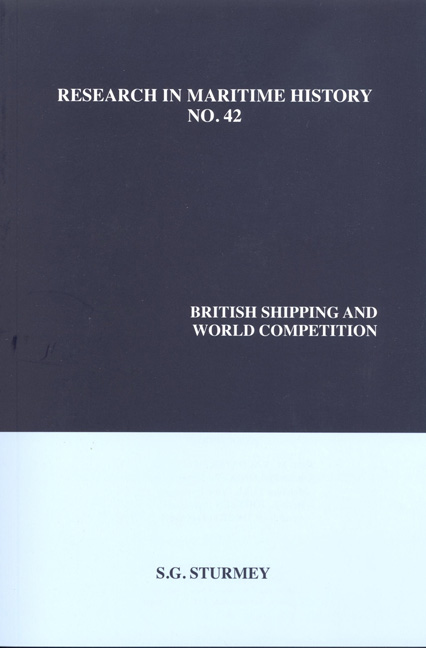Book contents
- Frontmatter
- Table of Contents
- Series Editor's Foreword
- About the Author
- Preface
- Figures and Tables
- Chapter 1 The Problem Defined
- Chapter 2 High Water: The Pre-1914 Period
- Chapter 3 War and Reconstruction
- Chapter 4 The Troubled Years: The Interwar Period
- Chapter 5 Nationalism in Shipping in the Interwar Years
- Chapter 6 The Birth of the Liberty
- Chapter 7 The Prosperous Age: The Postwar Period
- Chapter 8 Enemies of Competition in the Postwar Years
- Chapter 9 Flags of Convenience
- Chapter 10 Economics of Shipping Enterprises
- Chapter 11 Shipowning and Resource Allocation
- Chapter 12 Labour Relations and Labour Costs (by Basil Mogridge)
- Chapter 13 The Conference System
- Chapter 14 The Structure of the British Industry
- Chapter 15 The Question Answered
- Epilogue The Future
- Appendix The Contribution of British Shipping to the Balance of Payments
- Bibliography
- Index
Epilogue - The Future
- Frontmatter
- Table of Contents
- Series Editor's Foreword
- About the Author
- Preface
- Figures and Tables
- Chapter 1 The Problem Defined
- Chapter 2 High Water: The Pre-1914 Period
- Chapter 3 War and Reconstruction
- Chapter 4 The Troubled Years: The Interwar Period
- Chapter 5 Nationalism in Shipping in the Interwar Years
- Chapter 6 The Birth of the Liberty
- Chapter 7 The Prosperous Age: The Postwar Period
- Chapter 8 Enemies of Competition in the Postwar Years
- Chapter 9 Flags of Convenience
- Chapter 10 Economics of Shipping Enterprises
- Chapter 11 Shipowning and Resource Allocation
- Chapter 12 Labour Relations and Labour Costs (by Basil Mogridge)
- Chapter 13 The Conference System
- Chapter 14 The Structure of the British Industry
- Chapter 15 The Question Answered
- Epilogue The Future
- Appendix The Contribution of British Shipping to the Balance of Payments
- Bibliography
- Index
Summary
It is implicit in the preceding pages that British shipping has excellent prospects for the future. The internal constraints on growth which have been noted are inimical to the realization of these prospects. There are, however, signs that a new spirit is showing in the industry which will remove some or all of these constraints. It is because this new spirit has been detected that in chapter fifteen the critical period for the industry was stated to have lasted from 1920 to 1958: since 1958 there are signs that the traditional responses to competitive pressures are disappearing.
Eight signs of the new spirit have been discerned in the industry. First, there has been a recognition of the need for more research into all aspects of ship operating, including that necessary to determine trade trends and to predict changes. Second, some owners of cargo liners have built or ordered freighters with speeds of twenty knots instead of the more common fifteen knots. Third, tanker owners have swung over to the large tanker; whereas the typical tankers built for liner companies only two or three yeas ago were of about 20,000 deadweight tons, 45,000 tons is now usual. Fourth, owners of passenger vessels have bought second-hand ships from other owners and have begun to follow foreign practice in reconstructing ageing liners for further service. Fifth, tramp owners have overcome their preoccupation with the nine to twelve knot, 10,000-deadweight ton vessel and are building faster and larger ships. Sixth, some shipowners have noted that possibilities for expansion exist by opening new trades. Seventh, some liner owners give the impression of having begun to examine critically that traditional institution, the conference system. Eighth, and perhaps most important, influential sections of the industry seem to have rejected the view that all the troubles of British shipping can be attributed to people and forces outside the industry and to be coming to the view that the industry's salvation lies largely in its own hands.
It would be too much to say that the industry has been revolutionized or that all shipowners have become infected with the new spirit. Yet, unless these straws in the wind are figments of an imagination which wants to see British shipping as a vigorous and enterprising industry, there is ample ground for optimism.
- Type
- Chapter
- Information
- British Shipping and World Competition , pp. 339 - 348Publisher: Liverpool University PressPrint publication year: 2009

